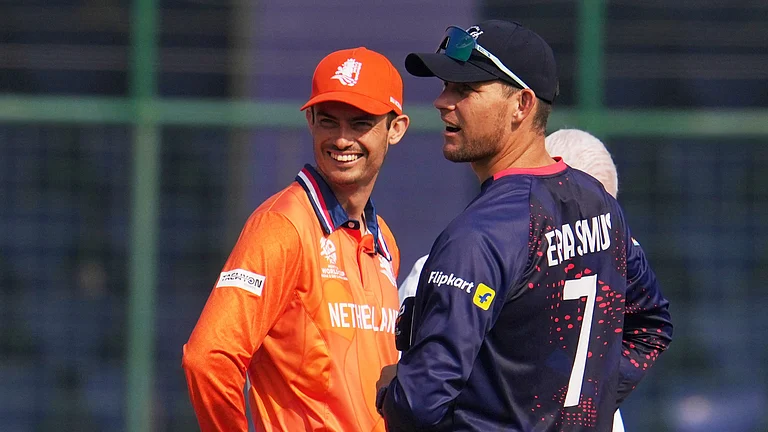The improvised landmine that blew up the vehicle in which Brigadier P.S. Shergill and his deputy were travelling in northern Kashmir is only the most recent of a spate of attacks on security forces since the ceasefire broke down on August 8. On the same day another group of militants, apparently from the Hizbul Mujahideen, attacked an army camp in Banihal with rockets and killed at least three jawans. These and other attacks in the past 20 days, including the car bomb that took the life of photographer Pradeep Bhatia of
The Hindustan Times , and the grenade that injured 18 civilians in Bijbehara show that the brief lull in violence that Kashmir experienced is over.
Does that mean the government too should resume its "proactive" counter-terrorist operations with full force again? The answer must be an unqualified "no". Renewed violence is only one facet of the developments taking place in Kashmir. The other is a profound questioning of the very purpose of violence that is deepening the schism between the Kashmiri and the jehadi militants. The best course is to act with restraint wherever possible in order to allow this schism to widen.
There are several signs of this growing schism. In Rajouri, 10 days ago, a gun battle erupted between members of the Lashkar-e-Toiba and the Hizbul Mujahideen, in which two members of the former and one from the latter were killed. The cause of this gun battle was more significant than the battle itself. The Lashkar had badly beaten up a local holy man accusing him of being a spy for the Indian security forces. This had been resented by the villagers who had gone to the Hizbul for support. Not only did this become a Kashmiri-versus-foreigner issue, but the reason the villagers and the Hizbul took such grave offence was the Lashkars barely veiled insinuation that followers of Kashmiri Sufi Islam could not be trusted. In Islamabad, around the same time, the Pakistan-created Harkat-ul-Mujahideen as good as admitted that rifts had appeared between Kashmiri groups which had wanted the ceasefire to continue and others that had opposed it. The Harkat severely criticised the former and asserted that jehad was the only way forward.
Perhaps most significant of all is a report from Kashmir that Masood, one of the key area commanders of the Hizbul Mujahideen, has issued a severe warning to all those who want to carve up Kashmir on the basis of religion, and declared that the borders of the state must remain inviolate. Not only is his position on this issue identical to that of the jklf, Mirwaiz Umer Farooq, Abdul Ghani Lone, Maulvi Abbas Ansari and Shabir Shah - not to mention the mainstream political parties in Kashmir - but it is directly counter to that of Pakistan and of Prof Abdul Ghani Bhat and Syed Ali Shah Geelani of the Hurriyat Conference, who are known supporters of Kashmirs accession to Pakistan. Masoods unambiguous declaration is all the more important because he had earlier refused to come overground and participate in the talks with the home secretary on August 3, and had strongly affirmed the need for the Hizbul to remain united under Salahuddin.
These developments suggest that in the wake of the failed peace talks and the broken ceasefire, Kashmiri militants of all hues are closing ranks and cutting the umbilical cord that has in the past linked them to Islamabad. The jklf did this a long time ago. The Hizbul may be on the way to doing it now. The pressure that is bringing about this consolidation is coming from the people of Kashmir. Prime Minister Vajpayee spoke the literal truth when he said in his independence day speech that Kashmiris were profoundly disappointed by the failure of the peace talks. But this is only half the story. The other half is that the jehadis, and perhaps their patrons in the isi, are the only people who believe that unending guerrilla attacks will serve any political purpose in Kashmir.
Kashmiris know that terrorism alone will never dislodge the Indian security forces. Since Pakistan cannot dislodge India by conventional war either, the most that the jehadis can do is to make life miserable and insecure for ordinary Kashmiris. This realisation has made more and more Kashmiris impatient to leave the past behind and face the challenge of the future. It is this desire to profit from the opportunities that the future holds instead of remaining locked in the past that is widening the distance between Kashmir and Pakistan, and insensibly closing it between Kashmir and India. The security forces strategy in Kashmir needs to be one that avoids doing anything that might put roadblocks in the way of this process.
New Delhi needs however to think one step further ahead. A break between the Hizbul Mujahideen and the jehadis will not end the violence in Kashmir. The most it will do is to increase the willingness of ordinary Kashmiris to give information on the jehadis whereabouts if the violence escalates and their lives become still more insecure. If there is to be a durable peace in the subcontinent, Pakistan must eventually subscribe to it too. There is not much that New Delhi can do directly to influence Pakistan and make it adopt a more realistic stand on Kashmir. That is a task that the United States and the European Union might be better placed to accomplish. But it might not be a bad idea for Vajpayee to meet Gen Musharraf in New York next month. At the very least it will enable the two heads of government to get a better measure of each other.























